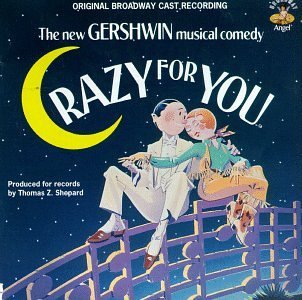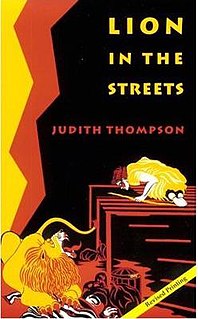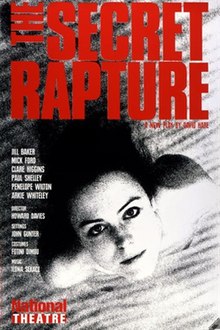
Crazy for You is a romantic comedy musical with a book by Ken Ludwig, lyrics by Ira Gershwin, and music by George Gershwin. Billed as "The New Gershwin Musical Comedy", it is largely based on the songwriting team's 1930 musical Girl Crazy, but also incorporates songs from several other productions. It won the 1992 Tony Award (Broadway) 1993 Olivier Award (London) and 1994 Dora Award (Toronto) for Best Musical.

Caroline Cruice Goodall is an English actress and screenwriter. She was nominated for AFI Awards for her roles in the 1989 miniseries Cassidy, and the 1995 film Hotel Sorrento. Her other film appearances include Hook (1991), Cliffhanger (1993), Schindler's List (1993), Disclosure (1994), White Squall (1996), The Princess Diaries (2001) and The Best of Me (2014).

Lion in the Streets is a two-act play by award-winning Canadian playwright Judith Thompson, workshopped as the first Public Workshop Project at the Tarragon Theatre in Toronto, Canada in May 1990. It was then produced in its current form one month later at the duMaurier Theatre Centre, also in Toronto, as part of the duMaurier World Stage Theatre Festival. Music for the production was composed and performed by Bill Thompson.

Gargoyles the Movie: The Heroes Awaken is a direct-to-video animated film produced by Walt Disney Television Animation. The film is actually the five-episode pilot ("Awakening") of the animated television series Gargoyles edited into one long feature film, approximately 100 minutes in length. As a result, numerous scenes from the original broadcast episodes were cut due to time constraints. In addition, a number of scenes were also moved around and some dialogue was changed. The episodes were produced and aired in 1994, and the film was released to laserdisc and VHS in February 1995 and featured an interactive VHS/LD board game. The pilot episodes have been released to DVD as part of Gargoyles: Season 1.

The Secret Rapture is a 1993 British drama film directed by Howard Davies and starring Juliet Stevenson, Joanne Whalley-Kilmer, Penelope Wilton, and Neil Pearson. The screenplay by David Hare is based on his 1988 play of the same title.
The BioShock series is a collection of story-driven first-person shooters in which the player explores dystopian settings created by Ken Levine and his team at Irrational Games. The first two games, BioShock and its direct sequel, BioShock 2, take place in the underwater city of Rapture in 1960 and 1968, which was influenced heavily by Ayn Rand's Objectivism. The third installment, BioShock Infinite, is set aboard the floating air-city of Columbia in 1912, designed around the concept of American Exceptionalism. Though Infinite is not a direct sequel to the previous games, the game is thematically linked; a short scene within the core Infinite game returns to Rapture, while the downloadable content BioShock Infinite: Burial at Sea tie in many of the plot elements between BioShock and BioShock Infinite.
"Blood Brothers" is the 20th episode of the first season of The CW television series, The Vampire Diaries and the 20th episode of the series overall. It originally aired on April 29, 2010. The episode was written by Kevin Williamson and Julie Plec and directed by Liz Friedlander.
The Greaser's Gauntlet is a 1908 American silent short adventure film directed by D. W. Griffith. It was released by the Biograph Company and copyrighted on August 6, 1908. The film introduced the first extended use of parallel editing in Griffith's work.
"Know Thy Enemy" is the 39st episode of the first season of The CW television series, The Vampire Diaries and the 21st episode of the series overall. It originally aired on May 6, 2010. The episode was written by Caroline Dries and Brian Young and directed by J. Miller Tobin. Isobel Dies
"The Return" is the premiere episode of the second season of The CW television series, The Vampire Diaries and the 23rd episode of the series overall. It originally aired on September 9, 2010. The episode was written by Kevin Williamson and Julie Plec and directed by J. Miller Tobin.
"Bad Moon Rising" is the 3rd episode of the second season of The CW television series, The Vampire Diaries and the 25th episode of the series overall. It originally aired on September 23, 2010. The episode was written by Andrew Chambliss and directed by Patrick Norris.
"Memory Lane" is the 4th episode of the second season of The CW television series, The Vampire Diaries and the 26th episode of the series overall. It originally aired on September 30, 2010. The episode was written by Caroline Dries and directed by Rob Hardy.
"No Exit" is the 14th episode of the fifth season of the American series The Vampire Diaries and the series' 103rd episode overall. "No Exit" was originally aired on February 27, 2014, on The CW. The episode was written by Brian Young and directed by Michael Allowitz.
"The Descent" is the 12th episode of the second season of The CW television series, The Vampire Diaries and the 34th episode of the series overall. It originally aired on January 27, 2011. The episode was written by Elizabeth Craft and Sarah Fain and directed by Marcos Siega.
"Daddy Issues" is the 13th episode of the second season of The CW television series, The Vampire Diaries and the 35th episode of the series overall. It originally aired on February 3, 2011. The episode was written by Kevin Williamson and Julie Plec and directed by Joshua Butler.
"Know Thy Enemy" is the 17th episode of the second season of The CW television series, The Vampire Diaries and the 39th episode of the series overall. It originally aired on April 7, 2011. The episode was written by Mike Daniels and directed by Wendey Stanzler.

Freaky Friday is a musical with music and lyrics by Tom Kitt and Brian Yorkey, and a book by Bridget Carpenter. This version was developed for licensing by Disney Theatrical Productions and had no Broadway run. It is based on the 1972 book of the same name by Mary Rodgers and its 1976, 1995 and 2003 film adaptations. In the story, when an overworked mother and her teenage daughter magically swap bodies, they have just one day to put things right again before the mom's wedding.






